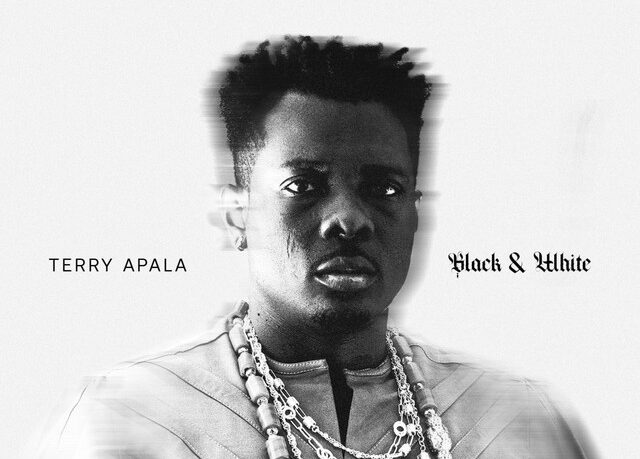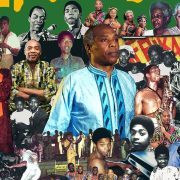Black and White is an ambitious distillation of Terry Apala’s genre-defying vision—one that honours Apala’s raw and earthy cadences while stretching its sonic possibilities.
By Abioye Damilare Samson
Over the last few years, a rising collective of Afro-Pop artistes has been reaching back into the archives of indigenous sounds—pulling from Fuji’s raw percussive intensity, Highlife’s undulating rhythms, and Apala’s gruff, call-and-response textures—to create something novel.
Asake has made a career out of Fuji’s intense cadences draped over Amapiano’s lung-bursting log drums, Seyi Vibez infuses his Street-Hop confessions with the lilt of Yoruba oral traditions, and The Cavemen have reanimated Highlife for a new generation with their nostalgia-drenched ballads.
But long before this full-circle renaissance took shape, Terry Apala had already been tinkering at the edges of music tradition, welding Apala’s sound to the muscular knock of Hip-Hop drums—a fusion he refines on Black and White, his latest project that pushes his sonic explorations even further.
Ever since he broke into the mainstream with the gritty and innovative “Champagne Shower”—produced by the inimitable Sess in 2016—Terry Apala has carved out a lane that is uniquely his own. His voice—gritty yet fluid, shaped by the guttural depths of Apala’s past—carries both heritage and reinvention in equal measure.
Over the years, he’s become a sonic alchemist, fusing the soul of Apala with the polished textures of Contemporary Pop sonics—a synthesis that ascended to new heights on “Apala Disco”, his 2024 collaboration with DJ Tunez.
The song’s first remix, featuring Apala stalwart, Musiliu Haruna Ishola, was a deliberate nod to heritage. Its follow-up remix, with Wizkid and Seyi Vibez, catapulted it into stratospheric height as one of 2024’s chart-toppers, which reaffirmed that, even in the streaming-first era, Apala’s primal cadence still commands the room.

Building on the commercial success of “Apala Disco”, Terry Apala returns with Black and White, a seven-track project that captures him at a crucial juncture. With a wave of new listeners captivated by his fusion of Apala and contemporary sounds, the project carries the weight of expectation.
Nowhere is this more apparent than in “Story”, the project’s opener, where comedian Oyemyke delivers a charged line, urging the singer to seize the moment and not let it pass him by. Over a sparse arrangement of airy guitar, muted trumpets, and a ghostly female backup vocal, Terry Apala lays bare the struggles that shaped him and the odd jobs he took on before committing to music.
The tempo shifts into party mode on the Spellz-produced “Sebebe”, a track driven by the propulsive energy of talking drum percussion and a richly layered live arrangement that calls revellers to the dancefloor.
At the heart of it all is Terry Apala’s gruff Apala vocals, the unshakable force that serves as the song’s backbone. He keeps the same energy flowing on “Bride Price”, teaming up with Bella Shmurda. But the rhythm is more grounded, balancing the dynamic flow with the traditional call-and-response that defines Apala’s style. It’s a song built for Yoruba wedding celebrations, sure to light up the dancefloor with its timeless delivery.
The mid-tempo groove continues to flow smoothly on “Na You”, where Terry Apala enlists the silky, emotive voice of Wurld and the Reggae-infused vocal of Wizard Chan. This love song sees the three artistes express their affection in distinct styles, each promising the lady true love, with Terry Apala taking charge of the chorus.
The track is punctuated by tender guitar strums, giving it a lush, serenading quality that elevates the heartfelt sentiment they share.

On “Methuselah”—perhaps the most innovative track on Black and White—Terry Apala flexes his ability to merge his Apala vocals with a drill beat, fluidly flowing in a Trap-like cadence as he delivers lines like, “Na this kind of loving I don dey look for tay tay ni yeah, Me I see the truth inside, Baby you dey enter me eyes”.
He returns to the party flow on “Allow Me”, though the delivery doesn’t quite live up to the standard set earlier on. But while it may not hit the same sweet spot, the track still tries to keep the momentum going.
Black and White closes on the Flamez-produced “Flex”, heavily rooted in the Apala sound, with talking drum-style relaying a message and a delivery that’s pure joy, that captures the track’s spirit of enjoyment and living in the moment.
For an artiste like Terry Apala, who has spent the better part of a decade drawing from Apala’s sound while bending it to fit the contours of modern Pop, Black and White is an ambitious distillation of his genre-defying vision—one that honors Apala’s raw and earthy cadences while stretching its sonic possibilities.
Across seven tracks, he moves between meditative introspection and kinetic party delivery, welding the genre’s call-and-response textures to modern production flourishes.

At its best, Black and White reveals his knack for reinvention: “Methuselah” finds new pockets in Apala’s cadence over a Trap-leaning beat, while “Sebebe” is a feverish blur of talking drums with live arrangements and “Na You” brings in Wurld and Wizard Chan for a love song steeped in warmth.
The production consistently impresses, with the local drums serving as the driving force, locking into the rhythms of Terry Apala’s husky delivery and pushing his melodies into exhilarating spaces.
Although not every experiment lands—“Allow Me” struggles to maintain the project’s momentum—but Black and White makes a compelling case for Terry Apala as one of Nigeria’s most innovative voices.
In a moment like this, when indigenous sounds are being recontextualised for new audiences, his work stands apart as both a revival of Apala’s rich textures and a daring reimagination of what the genre can become.
Lyricism – 1.0
Tracklisting – 1.0
Sound Engineering – 1.5
Vocalisation – 1.5
Listening Experience – 1.8
Rating – 6.8/10
Abioye Damilare is a music journalist and culture writer focused on the African entertainment Industry. Reading new publications and listening to music are two of his favourite pastimes when he is not writing. Connect with him on Twitter and IG: @Dreyschronicle



